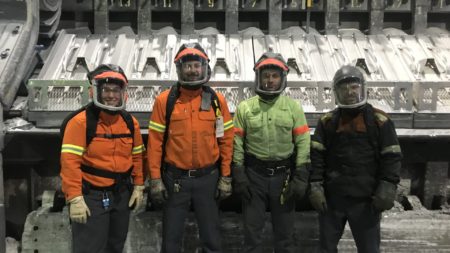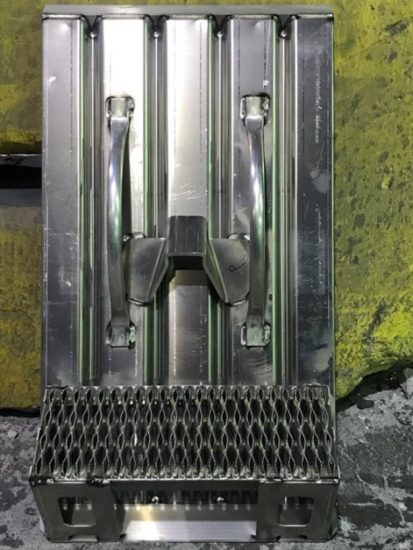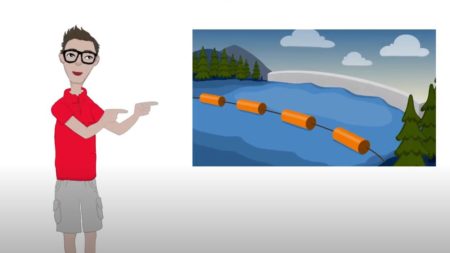New Pot Panel Opening Method at Arvida

Pictured: Nancy Plante, Raphaël Simard, Jonathan Forcier, and Jonathan Harvey. Absent: Carl Simard and Maxim Asselin.
With the involvement of employees, a completely new method of opening the pot panels has been developed at Arvida Works’ West Smelter Centre (WSC). The team has fitted the anode changer with equipment that can remove the panels for the operators, thus reducing several risks during the anode change.
The pilot project, which was carried out last fall on half a potroom, was successfully completed with no impact on operations. The team now wants to introduce the new procedure on all WSC pots.
Background
Every day, the operators have to climb to a height of four feet to the pot cover plate to remove the pot panels so that the operator in the anode changer can replace the anodes. This procedure is not without risk, considering that 75% of falls are related to anode changes. Since 2010, several teams have been working to reduce the frequency of falls from the pots when performing suspension lifting tasks and various pot maintenance and start-up operations.
Year after year, several incidents were reported of people falling when changing anodes,” said Raphaël Simard, Supervisor, WSC. “We decided to tackle the problem to eliminate the risks and improve our work method. A person used to have to climb on the pot and remove the panels manually; now, human handling has been reduced since we have fitted the anode changer with equipment that can remove the panels.”
The original panel had to be redesigned so as to work with the new procedure. Jonathan Forcier, Potline Operator, came up with the solution by drawing a sketch that served as the basis for the new part.
“Several ideas were put forward, but they seemed complicated to me,” said Jonathan Forcier. “I thought that it would be simpler to move the panel using the anode changer. It was just a matter of adding a part, called a sheath, to the existing panel.”
Another potline operator, Maxime Asselin, played the key role of facilitator to introduce the new concept to the work teams. He said, “We had to change a work method that everyone was used to. So, we carried out a pilot project in room 45B to show all the benefits of this new work method and make it easier for our teams to adopt it.”

An effective solution
Maxime Asselin added, “What matters most is our health and safety—we all want to still be healthy and fit when we go home in the evening. Before, during every shift we had to climb on 68 pots and lift two panels on each pot; this repetitive task caused fatigue and knee pain. Now, I am much less tired when I finish my shift, and I can already feel the positive effects that this is having on my body.”
Carl Simard, Superintendent, WSC, added, “There are many benefits to this change—it eliminates the risk of falls and musculoskeletal disorders, and exposure to contaminants and thermal stress. The likelihood of falls and all the inherent risks is reduced because employees no longer have to work directly above the pots, and less handling is required.”
Introducing the new concept to the entire WSC
All the pots in room 45B have been fitted with sheaths, and the goal is to extend the concept to the entire WSC. Raphaël Simard said, “To make sure that the project was viable, we tested it on half a potroom, as this corresponds to a full shift. We wanted to confirm that the new method could be introduced over time, and this testing phase lent the project credibility by proving that the new work method could be used without affecting operations.”
He added, “We had a solid team, especially with the contribution of Nancy Plante, Engineer and Project Manager, who helped move the project forward with the right resources and the necessary equipment. Everyone worked together with a common goal of continuous improvement. We are part of the base of the pyramid and have presented a solid and viable solution.”
The entire team would also like to acknowledge the employees who worked on the first phases of this great achievement over the past few years.


